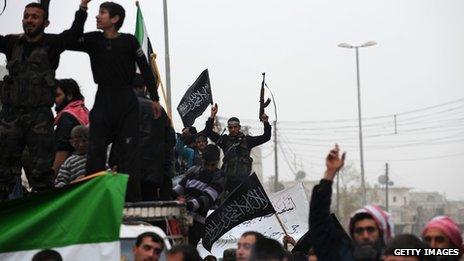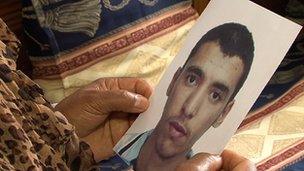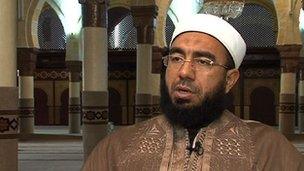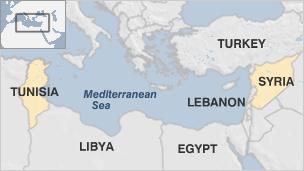Syria conflict: Why did my Tunisian son join the rebels?
- Published

Rebel fighters in Syria say Tunisians are among the biggest foreign forces
Tunisia's government says that some 800 of its citizens are fighting alongside Islamist rebels in Syria, although some estimates put the figure much higher. As radicalised young Muslims increasingly join the conflict, what of the families - and the political dilemma - they leave behind?
Aziza cannot help crying every time she looks at a picture of her only son who has gone to fight in a battle she neither supports nor understands - the battle for Syria.
I met the heart-broken mother at her one-bedroom flat in one of the slums on the outskirts of the capital city, Tunis.
It has been more than a year since 22-year-old Bilal went to declare jihad, or holy war, alongside rebels in Syria against government forces.

Aziza's son Bilal told her he was leaving to buy clothes and sell them in Tunisia
And she agonises over his picture all the time.
"Bilal was a good, caring son. He was the main source of income for the family, especially after his father died two years ago," said Aziza, fighting back her tears.
She remembers the moment he left.
"One day he told me and his sister that he was going to Libya to buy clothes and sell them at high prices in Tunis. He never came back. We knew later he was captured in Syria."
The jihadist trend has picked up steam in several Arab countries following the Syria revolution, which has entered its third year.
As more blood is shed in Syria's conflict between the government and the rebels, more young Muslims are being radicalised to fight in Syria.
This is not the first time that Tunisian men have taken part in jihadist activity. Security estimates say that hundreds fought in Iraq and Afghanistan.
'Not a terrorist'
Aziza found out about her son's fate last month when the Syrian government released a second list of foreign fighters, who they say had sneaked into the country to support the "terrorists" - a catch-all term that the government has been using to describe the rebels since the start of the revolution-turned-conflict more than two years ago.
The mother showed me a copy of this list, which was published in the Tunisian press.
All of the 26 names on the list are Tunisian, and they include Bilal's full name, his home address, date of birth and his mother's name.
What breaks her heart is that her son has been called "terrorist" in some Tunisian media outlets.
"He is not a terrorist but a victim. I don't know who brainwashed him into going to Syria. He could have stayed in his country and helped with money or clothes."
The phenomenon of young men fighting in Syria has raised alarm on the streets of Tunis.
The government publicly puts the number of Tunisians fighting in Syria at about 800.
But interior ministry sources told me the number was much higher.
"They are around 2,000," a security source said on condition of anonymity.
"Only 150 of them have returned. Most of them have been imprisoned for questioning."
It is hard to get authentic statistics for foreign fighters in Syria as the armed opposition is already divided into splinter groups and fighting along different frontlines. The number often quoted in the media is 5,000.
Rebel sources in the southern city of Deraa, the birthplace of the Syrian revolution, said that Tunisian jihadists form one of the biggest forces of foreign fighters in the war-torn country.
'Humanitarian mission'

Sheikh Bashir bin Hassan is among those who see Tunisia's young jihadists in Syria as heroic
Many secular Tunisians attribute the rise in radical Islam to the religious discourse of some Islamist preachers known as Salafists, who adopt a strict interpretation of their religion.
Following the 2010-11 Tunisian revolution. which ousted long-time President Zine al-Abidine Ben Ali, the Salafist-jihadist activity has increased significantly in an atmosphere of free politics and almost absent security.
Before the revolution, state surveillance of mosques across Tunisia was a fact of life.
In today's Tunisia, the state has lost control of most of the mosques to Salafist groups.
Many imams, like Sheikh Bashir bin Hassan, endorse jihad in Syria openly and are proud of what they see as the "heroic acts of the young jihadists".
"They are on a humanitarian mission. The West insists on associating jihad and Salafism to terrorism, which is not true," Sheikh Bashir told me in an interview inside a mosque in the town of Masakin, 200km (124 miles) south of Tunis.
For Sheikh Bashir, it is justifiable for Sunni Muslims to take arms against the Assad forces, who belong to a Shia sect, to protect oppressed fellow Sunnis - a stance that reflects the sectarian overtone of the conflict.
And he accuses the West of double standards.
"Let's imagine that the British government decided to attack a county with scud missiles to stamp out a peaceful rebellion. Europeans would be watching entire families being slaughtered day in day out. What would the young do? They would flock in droves to England to protect the oppressed."
Dialogue
Tunisia's Islamist-led coalition government is widely accused by the secular opposition of turning a blind eye to the rise in jihadists.

The government denies this but does admit it is difficult to monitor potential jihadists leaving the country's airports.
"They are faking tourism trips to Turkey and Lebanon," said Habib Ellouz, a leading member of parliament for the ruling Islamist Ennahda party.
He was referring to the two main crossing points for jihadists into Syria.
"It is easy to get to Syria - just fly to Turkey or Lebanon and you will be over the border and into the action," he added.
Mr Ellouz says the authorities cannot prevent Tunisians from travelling.
"We did not revolt against a dictator to now deny people freedom of movement. Police state tactics do not work. The only way to counter radicalisation of those unemployed youths is dialogue and moderate preaching."
The government says it will leave no stone unturned to repatriate captured Tunisians. But the process is not easy.
Tunisia has cut diplomatic ties with Syria in protest at the Assad regime's heavy-handed response to the rebellion. This means that getting any information about captured Tunisians is difficult - and getting them extradited is even more so.
Back at her apartment, waiting is the hardest thing for Aziza.
The charge her son faces in Damascus is serious: Belonging to al-Qaeda's network of fighters could carry the death penalty.